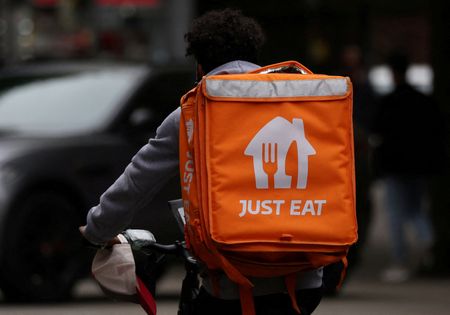By Suban Abdulla
LONDON (Reuters) -British food price inflation jumped to its highest in nearly a year in April, according to a survey published on Tuesday that said higher costs for retailers could put further upward pressure on shop prices.
The British Retail Consortium warned of the risk of further upward price pressures in the coming months as the industry faces increased costs, including a new packaging levy coming into force in October.
Food prices were up by an annual 2.6% in April, a stronger rise than March’s 2.4% increase, and the biggest increase since May 2024 when they rose 3.2%, the BRC said.
But overall shop prices fell by 0.1% in the 12 months to April after an annual fall of 0.4% the month before.
Mike Watkins, head of retailer and business insight at NielsenIQ, which publishes the data with the BRC, said he expected shoppers to remain cautious about spending on discretionary items despite the later timing of Easter this year having helped sales.
The Bank of England is trying to gauge to what extent the higher tax burden for employers will lead to price rises in stores and increase the risk of persistently high inflation pressure.
Britain’s headline rate of inflation slowed to 2.6% in March, but the BoE expects it will reach around 3.7% later this year, nearly double its 2% target against a backdrop of rising household bills and higher labour costs.
Last week BoE Governor Andrew Bailey, who warned of a hit to growth from U.S. tariffs, said he hoped the expected increase in inflation would prove transitory.
A separate BRC survey, published on Tuesday, showed more than half of human resources directors expect to reduce hiring due to the government’s planned Employment Rights Bill.
The bill, which proposes a raft of protections for millions of workers including guaranteed minimum hours, greater hurdles for sacking new staff and increased sick pay, is currently being debated in parliament.
“It is crucial that poor implementation of the upcoming Employment Rights Bill does not add further pressure to costs – pushing prices further up, and job numbers further down,” BRC Chief Executive Helen Dickinson said.
(Reporting by Suban Abdulla; editing by David Milliken)











